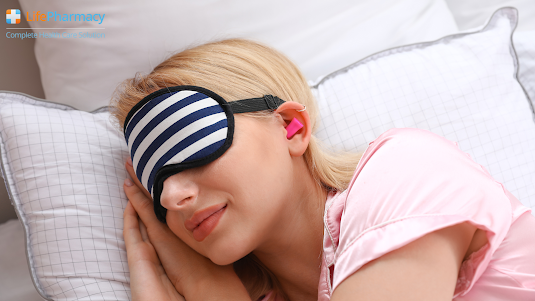Ear care is essential to overall health and well-being, and protecting your ears from damage is essential. One common method of protecting your ears while sleeping is by using earplugs. Earplugs are an excellent option to sleep peacefully and block out external noises. Earplugs can be conveniently purchased from online pharmacies, making them easily accessible in this modern age.
While earplugs can be useful, it is essential to know the potential dangers of overusing them and learn the proper safety procedures. This article discusses the benefits, drawbacks, and guidelines for sleeping with earplugs so you can make an informed decision about using them to protect your ears.
Related Posts: 11 Proven Ways To Stop Snoring Naturally
What are Earplugs?
Earplugs are a type of hearing protection that helps to prevent loud noises, such as snoring partners or other environmental noise, from disturbing your sleep. The ear canal-fitting devices are intended to prevent external noises from entering. Earplugs come in various sizes and materials, including foam, wax, silicone, and more. Depending on the type of earplug you choose, they can last anywhere from one night up to several months of wear. Earplugs are designed to provide an airtight seal against the noise outside your bedroom.
What are the Different Types of Earplugs Available?
Two main types of earplugs are available in the market: vented and non-vented.1. Vented
Vented earplugs can block outside noises while allowing background sounds like a fan or radio due to their tiny holes that balance the pressure in your ear. Various types can be useful for activities like flying or scuba diving.
- Wax: You can customize their shape to fit your ear size, and they are suitable for use during swimming and sleeping.
- Foam: The material is comfortable due to its soft and porous nature. The material is prone to bacterial growth and needs to be replaced regularly.
Silicone: These are not suitable for side sleepers as they are firm and designed for multiple uses.
2. Non-vented
Non-vented earplugs are designed to create a complete seal in the ear, effectively blocking external noise. Unlike vented earplugs that allow some sound to pass through, non-vented ear plugs offer higher sound blocking.
These earplugs are particularly beneficial when loud sounds need to be minimized or eliminated, such as in industrial settings, concerts, or during sleep. Non-vented earplugs can help individuals create a tight seal and achieve a quieter and more peaceful environment.
What are the Benefits of Wearing Earplugs While Sleeping?
Using earplugs while sleeping can offer several benefits, and with the advent of pharmacies online, it has become more accessible for people to purchase them. Wearing earplugs while sleeping can help minimize the effects of noise pollution, which can be a major source of disturbance for many, especially those living in bustling urban areas.
Noise pollution can cause sleep disturbances and impact sleep quality, leading to fatigue, irritability, and other health issues. Earplugs can also benefit people who share their bed with a snoring partner, as they can block out the noise and help them sleep better.
Earplugs can also provide a sense of privacy and calm, making it easier to relax and drift off to sleep. Using online pharmacies to purchase earplugs can greatly improve sleep quality due to their convenience.
What are the Potential Side Effects of Wearing Earplugs While Sleeping?
Even though earplugs are generally considered safe, it is necessary to be informed of the potential adverse effects of frequent use to care for your ears properly. A common problem is the accumulation of earwax that may arise when earplugs push the wax farther into the ear canal. This can cause temporary hearing loss, tinnitus, and other complications.
Using ear drops or seeking a doctor's help is recommended to remove earwax buildup and reduce the associated risk safely. Additionally, ear infections can occur due to the growth of bacteria on earplugs, resulting in painful infections that may impact hearing if left untreated.
Using earplugs regularly requires caution and preventive measures to maintain good ear health. This includes properly cleaning and disinfecting earplugs and being attentive to any signs of discomfort or infection. By promptly prioritizing ear care and addressing any potential issues, individuals can enjoy the benefits of using earplugs while minimizing the associated risks.
What is the Reason Behind Using Earplugs While Sleeping?
Earplugs are an economical and efficient option to safeguard one's ears against loud noises, particularly in work environments with high decibel levels. For individuals with difficulty falling asleep due to noise disruptions, such as light sleepers or those living in loud areas, noise-canceling devices can greatly enhance their quality of life. This is particularly true for those who are affected by snoring.
Snoring has the potential to considerably impact the quality of sleep, resulting in fatigue and various health issues. If you're bothered by snoring or want to protect your hearing while sleeping, using earplugs is a practical solution that can help improve the quality of your sleep. People who are affected by snoring may find this to be extremely useful.
What are Some Natural Alternatives to Help with Sleep?
In addition to using earplugs, incorporating natural alternatives can contribute to better sleep quality, leading to improved overall health, including heart health. Natural remedies like lavender oil, chamomile tea, and melatonin supplements have been found to promote relaxation and enhance sleep quality, positively impacting cardiovascular health.
Regular exercise promotes physical and mental relaxation, benefiting heart health. Regular physical activity helps manage stress levels and promotes better sleep quality. Maintaining a consistent sleep schedule is also crucial for obtaining sufficient restorative sleep, essential for optimal heart health.
People can enhance the benefits for both their sleep quality and general heart health by combining the use of earplugs, natural therapies, regular exercise, and a regular sleep schedule. Maintaining a holistic approach to well-being, encompassing various lifestyle factors, is important to remember that it can lead to better sleep and contribute to a healthy heart.
Related Posts: Effective Ways to Lower Blood Pressure
The Bottom Line
People who want to preserve their hearing and sleep better should consider earplugs. Since they are easily accessible through online chemists UK and other vendors provide a convenient solution for those seeking improved sleep or quieter environments.
However, taking the necessary precautions when using them regularly is essential to avoid potential health issues. Natural remedies, such as lavender oil and exercise, can enhance sleep quality and promote heart health. Therefore, it's crucial to consider natural and medical solutions when looking for ways to improve sleep and overall well-being.



Comments
Post a Comment